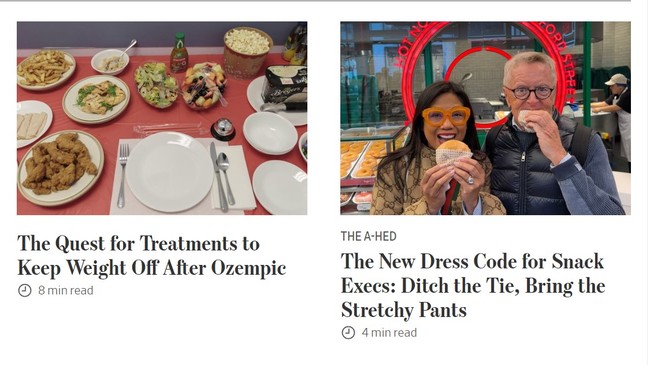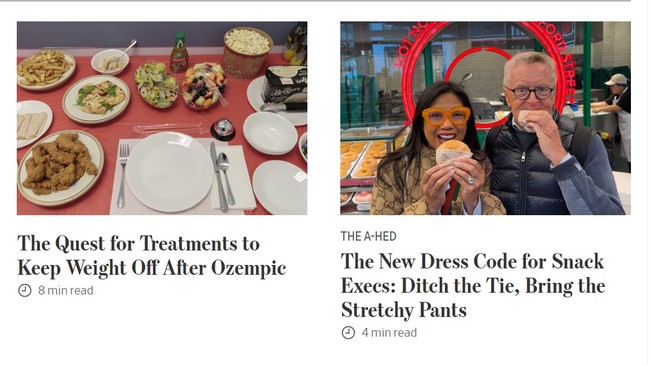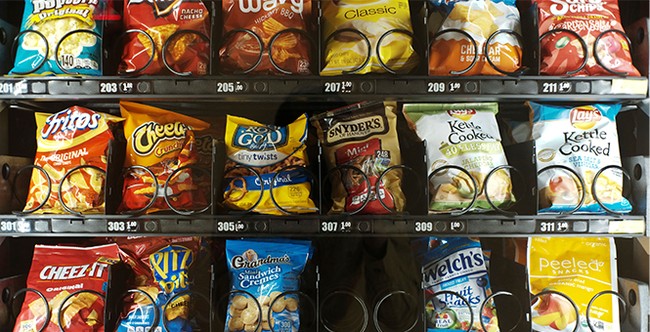So, I saw these two articles side by side in the Wall Street Journal just a minute ago, and I had to share the juxtaposition with you – it was just that bizarre.
I mean, is this not America?

I was dying. And this is just a rambling little thought piece because of it.
Of course, I’m team Stretchy, although I work my hardest to maintain a waist that both apparent (not anything remotely svelte), and can still accommodate the occasional button closure above a pant/shorts zipper. Small victories make big ones possible, I always say, and are great for your self-esteem.
But here is our national, guilty, forever war. Our avoirdupois ying and yang eternal battle right there, cheek by jowl (Which, oddly enough, is what my Daddy used to refer to my chubby cheeks stuffed with something yummy as.): Angular thin face vs snack cheeks.
The Ozempic thing I find really interesting (and the incessant various chirpy dancing commercials on TV really annoying). The snacks, munchies, 8 oz sodas ballooning to a Thirsty Two Ouncers (and bigger), etc., and a sedentary lifestyle have shoved a good number of folks over the edge into Type-2 diabetes. In the age of pharmaceutical miracles, that’s no longer a formula for premature blindness and loss of digits or worse. That’s a blessing, no?
But we’re also in an age of getting things done quicker and with a minimal amount of effort. Got other things to do, and no time to do them.
Losing weight or keeping it off is one of those, and if something magically helps do it with as little pain as possible, I can see where it’d be popular, whatever its original had been.
Enter Ozempic, and that skinny face. What was purely a Godsend for Type-2 types has become pretty popular for anyone asking for it.
Spotted at Toronto Pearson 👀 they are promoting this pharmaceutical OZEMPIC everywhere. And all you need to do is ask, apparently pic.twitter.com/fMhitDkPjG
— Melissa 🇨🇦 (@MelissaLMRogers) May 8, 2024
One New York Times writer says the science leads one to blame American love of processed foods and their effect on the brain. She says we all live in “Cheesecake Park,” and I guess the science she’s following says it’s not our fault.
These lab guys raised some happy rats on a healthy diet and then switched them up to what an “American” diet supposedly consists of. The lab rats were big mad when the scientists switched them back to granola.
Ever since I was a teenager, I have dreamed of shedding a lot of weight. So when I shrank from 203 pounds to 161 in a year, I was baffled by my feelings. I was taking Ozempic, and I was haunted by the sense that I was cheating and doing something immoral.
I’m not the only one. In the United States (where I now split my time), over 70 percent of people are overweight or obese, and according to one poll, 47 percent of respondents said they were willing to pay to take the new weight-loss drugs. It’s not hard to see why. They cause users to lose an average of 10 to 20 percent of their body weight, and clinical trials suggest that the next generation of drugs (probably available soon) leads to a 24 percent loss, on average. Yet as more and more people take drugs like Ozempic, Wegovy and Mounjaro, we get more confused as a culture, bombarding anyone in the public eye who takes them with brutal shaming.
…But then Dr. Kenny and his colleague exposed the rats to an American diet: fried bacon, Snickers bars, cheesecake and other treats. They went crazy for it. The rats would hurl themselves into the cheesecake, gorge themselves and emerge with their faces and whiskers totally slicked with it. They quickly lost almost all interest in the healthy food, and the restraint they used to show around healthy food disappeared. Within six weeks, their obesity rates soared.
After this change, Dr. Kenny and his colleague tweaked the experiment again (in a way that seems cruel to me, a former KFC addict). They took all the processed food away and gave the rats their old healthy diet. Dr. Kenny was confident that they would eat more of it, proving that processed food had expanded their appetites. But something stranger happened. It was as though the rats no longer recognized healthy food as food at all, and they barely ate it. Only when they were starving did they reluctantly start to consume it again.
Though Dr. Kenny’s study was in rats, we can see forms of this behavior everywhere. We are all living in Cheesecake Park — and the satiety-stealing effect of industrially assembled food is evidently what has created the need for these medications. Drugs like Ozempic work precisely by making us feel full. Carel le Roux, a scientist whose research was important to the development of these drugs, says they boost what he and others once called “satiety hormones.”
The author also talks about being shamed for taking Ozmepic and the stigma that follows folks who use these drugs. Is there? I don’t feel as if I personally want to condemn someone who feels they need to, most certainly not if they medically have to. I might give you the side-eye if you go that route to “lose that last ten pounds” because it certainly seems extreme to me, particularly with the known side effects, and there are many.
But I’m not about to rip on someone for it.
Besides the “stone stomach” (Gastroparesis) issue, stomach pain, and gastrointestinal upsets, there can be emotional side effects, too. Because the drug is being so wide-spread among people who are only using it for weight loss, there are new side-effects being documented all the time.
A very interesting new emerging set of negative side effects for Ozempic are erectile dysfunction and low testosterone, which is the opposite of what you’d expect with weight loss. Clearly, the drug “works” in ways that we don’t fully understand. pic.twitter.com/JE8miUNwg9
— RAW EGG NATIONALIST (@Babygravy9) April 30, 2024
A person has to make their own decision if it’s worth it to them.
Another interesting aspect, which is what the WSJ article is about, is what happens after you hit the weight you were taking the Ozempic for. You haven’t learned a thing about moderating your lifestyle and diet – the drug did it for you in the majority of cases.
What do you do not to gain that weight back, or have to go on the drug again, which is also problematic.
OH, YAY! MORE DRUGS IN THE PIPELINE
…Makers of the weight-loss juggernauts have a big problem to overcome: Many people stop taking GLP-1 drugs. Their insurers won’t pay for the drugs, they can’t tolerate side effects, or they don’t want to take medication long term. Only 14% of people surveyed in 2023 by KFF, the health-policy research organization, were interested in taking a weight-loss drug once they were told they might gain weight back if they stopped.
“The unmet need has shifted from how do you lose weight to how do you keep it off,” said Dr. Harith Rajagopalan, chief executive officer of Fractyl Health, a Burlington, Mass., biotech company working on two therapies to help people keep weight off.
New treatments
Drugmakers are designing treatments to help people maintain weight, as well as weight-loss pills or long-acting injections that might be easier for patients to use than current injectables. The biotech company Amgen is testing a long-acting injectable that helped people keep weight off for up to five months after they stopped taking it in an early study.
That doesn’t sound like much of an answer, does it?
Let’s look at that again.

The fact is, as the picture to the right illustrates, the snacks are always going to be there. The snack and food companies work awfully hard to make it all so enticing.
Somehow one has to develop the internal fortitude to fight off the snack attacks.
The New Dress Code for Snack Execs: Ditch the Tie, Bring the Stretchy Pants
For food-company directors, part of the gig is sampling—a lot—of America’s sandwiches, doughnuts and pretzel bites
Corporate directors have hefty responsibilities at quarterly board meetings. They oversee strategy, governance, executive compensation—real serious stuff. But those elite few serving on food-company boards truly bite into their work.
In the name of due diligence, for instance, directors munch throughout the board meetings of J & J Snack Foods, the company behind the SuperPretzel, ICEE frozen treats and Dippin’ Dots.
In any discussion, at least one director inevitably excuses themself from the long conference-room table to fetch more snacks, and no one takes offense, according to director Roy Jackson.
“Somebody’s doing a presentation and it is like, you know, sorry. I’ve got to have a pretzel bite or churro,” he says.
To attract inflation-weary diners, restaurants are relying on promotions such as limited-time dishes and expanded menus. Packaged food and snack brands are using new offerings to entice shoppers.
Self-control doesn’t come in pill form and if you don’t medically need it for your health, you probably shouldn’t stay on it forever.
Personally, I’ll never have those killer cheeks, as I freely admit to having my own self-control issues. With an ability to be positive about ‘most any situation, I also like to think my chubby ones help keep wrinkles at bay.
Net positive there.
And there’s the conundrum of the juxtaposition.
The ideal we reach for and the reality we live with.

